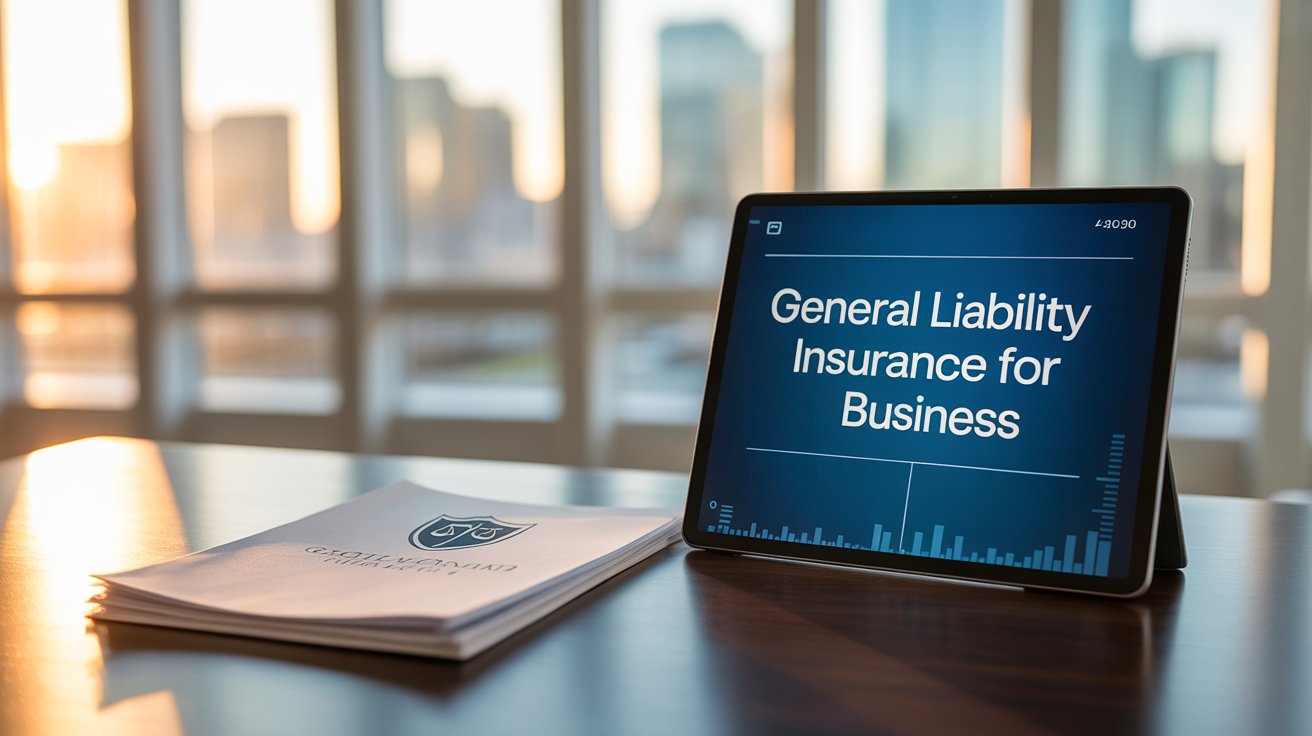The Ultimate Guide to General Liability Insurance for Business
Introduction
Running a business comes with inherent risks—customer injuries, property damage, or legal disputes can arise unexpectedly. General liability insurance for business is a foundational coverage that protects companies from financial losses due to third-party claims. Whether you own a small startup or a large corporation, understanding this insurance is crucial for risk management.
In this comprehensive guide, we’ll explore:
- What general liability insurance for business covers
- Why it’s essential for different industries
- How much coverage your business needs
- Career opportunities in the insurance sector
- Tips for choosing the best policy
By the end, you’ll have a clear understanding of how general liability insurance for business safeguards your operations and why it’s a non-negotiable investment.
What Is General Liability Insurance for Business?
General liability insurance for business (often called commercial general liability or CGL insurance) is a policy that protects companies from lawsuits and claims involving:
- Bodily injury – If a customer slips and falls in your store
- Property damage – If your employee accidentally damages a client’s property
- Advertising injury – If your business faces a defamation or copyright claim
This insurance covers legal fees, medical expenses, and settlements, preventing unexpected costs from crippling your business.
Key Coverages in a General Liability Policy
- Third-Party Bodily Injury – Covers medical expenses if someone gets hurt on your premises.
- Property Damage Liability – Pays for repairs if your business damages someone else’s property.
- Personal and Advertising Injury – Protects against libel, slander, or false advertising claims.
- Legal Defense Costs – Covers attorney fees, even if the lawsuit is groundless.
Since lawsuits can arise at any time, having general liability insurance for business is a proactive way to mitigate financial risks.
Why Your Business Needs General Liability Insurance
Many business owners underestimate their exposure to liability risks. Here’s why general liability insurance for business is indispensable:
1. Protection Against Costly Lawsuits
A single lawsuit can cost thousands—or even millions—in legal fees and settlements. Without general liability insurance for business, you’d pay these expenses out of pocket, potentially jeopardizing your company’s future.
2. Contractual and Lease Requirements
Landlords, clients, and vendors often require proof of general liability insurance for business before signing contracts. Without it, you could lose lucrative opportunities.
3. Enhances Business Credibility
Clients and partners trust insured businesses more. Displaying your coverage signals professionalism and financial stability.
4. Covers Common Risks Across Industries
- Retail stores – Customer injuries (e.g., slip-and-fall accidents)
- Contractors – Property damage during projects
- Consultants – Defamation claims from dissatisfied clients
No matter your industry, general liability insurance for business provides a safety net against unpredictable claims.
How Much General Liability Insurance Does Your Business Need?
The right coverage depends on factors like:
- Industry risks (high-risk businesses need higher limits)
- Business size and revenue
- Contractual obligations (some clients require $1M+ in coverage)
Typical Coverage Limits
- $1 million per occurrence – Covers a single claim
- $2 million aggregate – Maximum payout per policy term
For added protection, consider an umbrella policy, which extends your liability limits beyond standard general liability insurance for business.
Cost of General Liability Insurance
Premiums vary based on:
- Business type (a construction firm pays more than a freelance writer)
- Location (states with higher litigation rates have pricier premiums)
- Claims history (past lawsuits increase costs)
On average, small businesses pay $500–$1,000 annually for general liability insurance for business, but shopping around can help find affordable rates.
Career Opportunities in the Insurance Industry
If you’re passionate about risk management, the insurance sector offers rewarding career paths related to general liability insurance for business:
1. Insurance Underwriter
- Assesses business risks and determines policy terms
- Requires strong analytical skills and industry knowledge
2. Claims Adjuster
- Investigates liability claims and negotiates settlements
- Ideal for problem-solvers with attention to detail
3. Insurance Agent/Broker
- Helps businesses find the best general liability insurance for business policies
- Sales and customer service skills are essential
4. Risk Manager
- Works with corporations to minimize liability exposures
- Often requires a background in finance or law
The insurance industry is growing, with the Bureau of Labor Statistics projecting a 6% increase in jobs by 2031. Professionals with expertise in general liability insurance for business are in high demand.
Understanding General Liability Insurance for Business
General liability insurance for business (also known as commercial general liability or CGL) is designed to protect companies from common risks, including:
- Customer injuries (e.g., a client tripping in your office)
- Damage to third-party property (e.g., breaking a client’s equipment)
- Reputational harm claims (e.g., defamation or false advertising lawsuits)
Without this coverage, businesses could face devastating out-of-pocket legal expenses.
What Does a General Liability Policy Include?
✔ Bodily Injury Coverage – Medical bills if someone gets hurt at your workplace
✔ Property Damage Protection – Repairs or replacements for damaged client property
✔ Advertising Liability – Legal defense for copyright infringement or slander claims
✔ Legal Defense Costs – Attorney fees, even for frivolous lawsuits
Since lawsuits can arise unexpectedly, general liability insurance for business acts as a financial safety net.
Top Reasons Businesses Can’t Afford to Skip This Coverage
Many entrepreneurs assume they won’t face lawsuits—until they do. Here’s why general liability insurance for business is non-negotiable:
1. Lawsuits Are More Common Than You Think
Even a minor incident (like a customer slipping on a wet floor) can lead to a costly lawsuit. Without general liability insurance for business, legal fees alone could bankrupt a small company.
2. Clients and Landlords Often Require It
Many contracts—especially with large clients or commercial landlords—mandate proof of general liability insurance for business. Without it, you could lose key opportunities.
3. It Builds Trust with Customers
Displaying proof of insurance reassures clients that you’re a professional, responsible business.
4. Coverage Adapts to Various Industries
- Restaurants – Covers food-related illnesses or customer injuries
- Contractors – Protects against accidental property damage
- Retailers – Shields against slip-and-fall claims
No matter your field, general liability insurance for business is a smart investment.
How Much Coverage Is Enough?
The right amount of general liability insurance for business depends on:
- Industry risks (high-liability fields need higher limits)
- Business size (larger companies typically require more coverage)
- Contractual obligations (some clients demand $2M+ in coverage)
Standard Policy Limits
- $1 million per incident – Maximum payout for a single claim
- $2 million aggregate – Total coverage per policy term
For extra protection, consider an umbrella policy, which extends liability limits beyond standard general liability insurance for business.
What Does It Cost?
Premiums vary based on:
- Business type (a roofing company pays more than a consulting firm)
- Location (states with high litigation rates have steeper costs)
- Claims history (past incidents increase premiums)
Most small businesses pay 40–40–100 per month for general liability insurance for business, but comparing quotes can help secure better rates.
Careers in Commercial Liability Insurance
If you’re interested in risk management, the insurance industry offers lucrative career paths related to general liability insurance for business:
1. Commercial Insurance Underwriter
- Evaluates business risks and sets policy terms
- Requires strong analytical and decision-making skills
2. Liability Claims Adjuster
- Investigates claims and negotiates payouts
- Ideal for detail-oriented problem solvers
3. Business Insurance Agent
- Helps companies find the best general liability insurance for business policies
- Combines sales expertise with risk assessment knowledge
4. Corporate Risk Consultant
- Advises businesses on minimizing liability exposures
- Often requires a finance or legal background
With the insurance sector expected to grow 7% by 2030, professionals specializing in general liability insurance for business are in high demand.
How to Choose the Right Policy
Not all insurers offer the same benefits. Follow these steps to find the best general liability insurance for business:
1. Identify Your Biggest Risks
- Do you host clients on-site? Work with expensive equipment?
- Consult an insurance broker for a tailored assessment
2. Get Multiple Quotes
- Compare at least three providers
- Look beyond price—check coverage exclusions and claim response times
3. Review Exclusions Carefully
Some policies exclude certain risks (e.g., cyber incidents, employee injuries). Ensure your general liability insurance for business covers your specific exposures.
4. Research the Insurer’s Reputation
- Check AM Best ratings for financial stability
- Read customer reviews on claims handling
5. Bundle Policies for Discounts
Many insurers offer discounts when combining general liability insurance for business with:
- Commercial auto insurance
- Workers’ compensation
- Professional liability coverage
How to Choose the Best General Liability Insurance Policy
Not all policies are equal. Follow these steps to secure optimal coverage:
1. Assess Your Business Risks
- Identify potential liabilities (e.g., customer interactions, property exposure)
- Consult an insurance expert for a tailored recommendation
2. Compare Multiple Quotes
- Obtain quotes from at least 3–5 insurers
- Look beyond price—check coverage limits and exclusions
3. Review Policy Exclusions
Some policies exclude certain risks (e.g., professional errors, cyberattacks). Ensure your general liability insurance for business aligns with your needs.
4. Check Insurer Reputation
- Read customer reviews and ratings (e.g., AM Best, BBB)
- Choose a financially stable provider with fast claims processing
5. Bundle Policies for Savings
Many insurers offer discounts when bundling general liability insurance for business with other coverages like:
- Commercial property insurance
- Workers’ compensation
- Professional liability insurance
Final Thoughts: Protect Your Business Today
General liability insurance for business is not just a legal formality—it’s a strategic investment in your company’s longevity. From preventing financial disasters to enhancing credibility, this coverage is essential for any business owner.
If you haven’t secured a policy yet, start comparing quotes today. The right general liability insurance for business could mean the difference between weathering a lawsuit and facing bankruptcy.






Leave a Reply